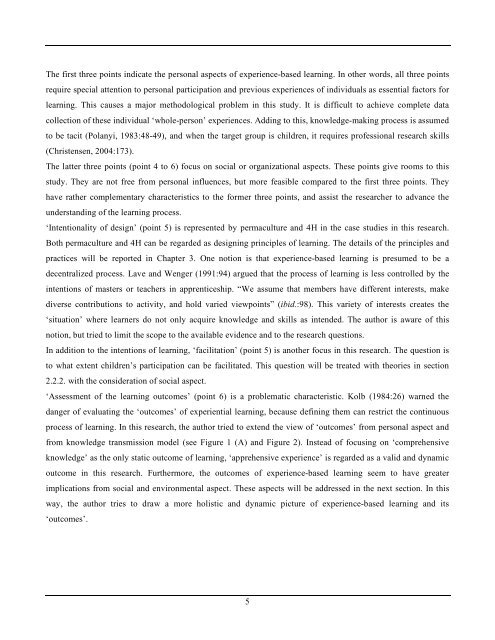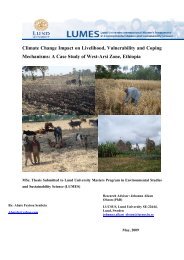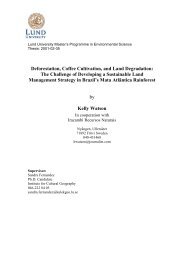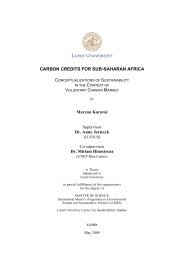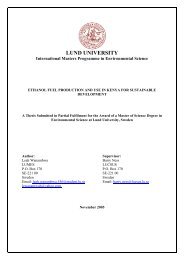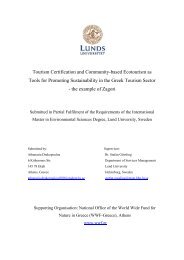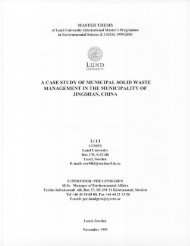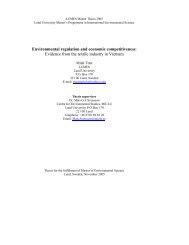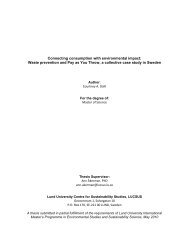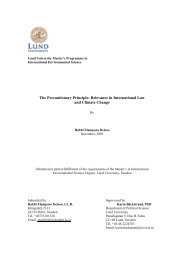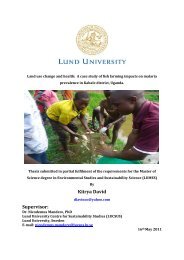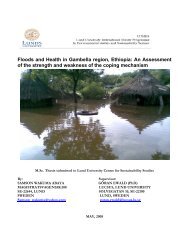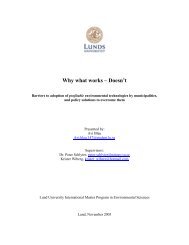Principles and Practices of 4H and Permaculture - lumes
Principles and Practices of 4H and Permaculture - lumes
Principles and Practices of 4H and Permaculture - lumes
Create successful ePaper yourself
Turn your PDF publications into a flip-book with our unique Google optimized e-Paper software.
The first three points indicate the personal aspects <strong>of</strong> experience-based learning. In other words, all three pointsrequire special attention to personal participation <strong>and</strong> previous experiences <strong>of</strong> individuals as essential factors forlearning. This causes a major methodological problem in this study. It is difficult to achieve complete datacollection <strong>of</strong> these individual ‘whole-person’ experiences. Adding to this, knowledge-making process is assumedto be tacit (Polanyi, 1983:48-49), <strong>and</strong> when the target group is children, it requires pr<strong>of</strong>essional research skills(Christensen, 2004:173).The latter three points (point 4 to 6) focus on social or organizational aspects. These points give rooms to thisstudy. They are not free from personal influences, but more feasible compared to the first three points. Theyhave rather complementary characteristics to the former three points, <strong>and</strong> assist the researcher to advance theunderst<strong>and</strong>ing <strong>of</strong> the learning process.‘Intentionality <strong>of</strong> design’ (point 5) is represented by permaculture <strong>and</strong> <strong>4H</strong> in the case studies in this research.Both permaculture <strong>and</strong> <strong>4H</strong> can be regarded as designing principles <strong>of</strong> learning. The details <strong>of</strong> the principles <strong>and</strong>practices will be reported in Chapter 3. One notion is that experience-based learning is presumed to be adecentralized process. Lave <strong>and</strong> Wenger (1991:94) argued that the process <strong>of</strong> learning is less controlled by theintentions <strong>of</strong> masters or teachers in apprenticeship. “We assume that members have different interests, makediverse contributions to activity, <strong>and</strong> hold varied viewpoints” (ibid.:98). This variety <strong>of</strong> interests creates the‘situation’ where learners do not only acquire knowledge <strong>and</strong> skills as intended. The author is aware <strong>of</strong> thisnotion, but tried to limit the scope to the available evidence <strong>and</strong> to the research questions.In addition to the intentions <strong>of</strong> learning, ‘facilitation’ (point 5) is another focus in this research. The question isto what extent children’s participation can be facilitated. This question will be treated with theories in section2.2.2. with the consideration <strong>of</strong> social aspect.‘Assessment <strong>of</strong> the learning outcomes’ (point 6) is a problematic characteristic. Kolb (1984:26) warned thedanger <strong>of</strong> evaluating the ‘outcomes’ <strong>of</strong> experiential learning, because defining them can restrict the continuousprocess <strong>of</strong> learning. In this research, the author tried to extend the view <strong>of</strong> ‘outcomes’ from personal aspect <strong>and</strong>from knowledge transmission model (see Figure 1 (A) <strong>and</strong> Figure 2). Instead <strong>of</strong> focusing on ‘comprehensiveknowledge’ as the only static outcome <strong>of</strong> learning, ‘apprehensive experience’ is regarded as a valid <strong>and</strong> dynamicoutcome in this research. Furthermore, the outcomes <strong>of</strong> experience-based learning seem to have greaterimplications from social <strong>and</strong> environmental aspect. These aspects will be addressed in the next section. In thisway, the author tries to draw a more holistic <strong>and</strong> dynamic picture <strong>of</strong> experience-based learning <strong>and</strong> its‘outcomes’.5


